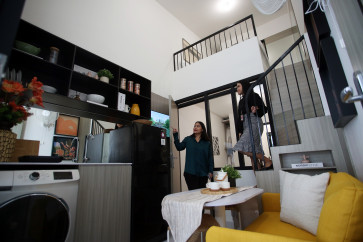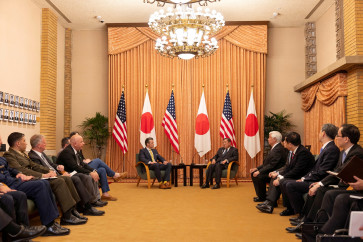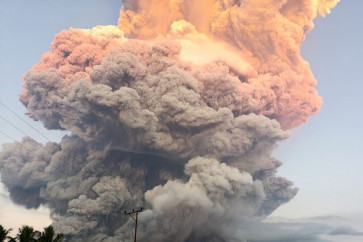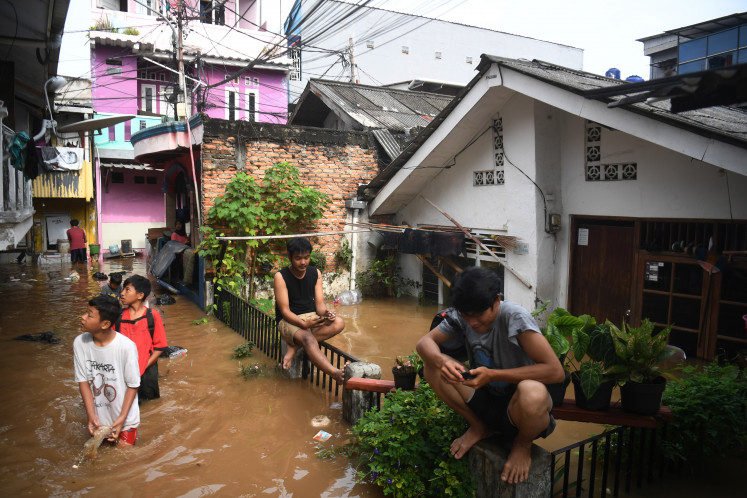Popular Reads
Top Results
Can't find what you're looking for?
View all search resultsPopular Reads
Top Results
Can't find what you're looking for?
View all search resultsIn Lombok, Wetu Telu marks a unique holiday
Origins: The Wetu Telu people believe that their forebears were the first to receive Islamic teachings on Lombok Island after the Wali Songo arrived in the 17th century
Change text size
Gift Premium Articles
to Anyone
 Origins: The Wetu Telu people believe that their forebears were the first to receive Islamic teachings on Lombok Island after the Wali Songo arrived in the 17th century. (JP/Panca Nugraha)" border="0" height="288" width="510">Origins: The Wetu Telu people believe that their forebears were the first to receive Islamic teachings on Lombok Island after the Wali Songo arrived in the 17th century. (JP/Panca Nugraha)
Origins: The Wetu Telu people believe that their forebears were the first to receive Islamic teachings on Lombok Island after the Wali Songo arrived in the 17th century. (JP/Panca Nugraha)" border="0" height="288" width="510">Origins: The Wetu Telu people believe that their forebears were the first to receive Islamic teachings on Lombok Island after the Wali Songo arrived in the 17th century. (JP/Panca Nugraha)The traditional community of Wetu Telu in Bayan district, North Lombok, West Nusa Tenggara (NTB), has a unique way of celebrating Idul Fitri.
Three days after the official holiday, there is a Lebaran Adat, or communal post-fasting observance at Bayan Beleq, one of the oldest mosques on Lombok Island.
The ritual, still sacred, aims at preserving the regionâs culture, tradition and wisdom, while maintaining the history of Islamâs entry into Lombok, known as the island of a thousand mosques.
As the fasting month ended, preparations were under way in the complex of Bayan Beleg Mosque in Bayan, around 90 kilometers north of Mataram, the capital of NTB. Later, Idul Fitri prayers began in the same way as those conducted in most mosques.
However, there were only 44 kyai, or religious leaders, attending the prayers, dressed in cotton sarongs and white shirts with white headcloths. The kyai of Wetu Telu comprised four chief clerics and 40 other Islamic scholars.
One delivered a sermon derived from the communityâs traditional scroll containing verses in Arabic. It conveyed an expression of gratitude, a statement of the need for harmony between man, God and nature, as well as ethical teachings.
The kyai greeted each other and were welcomed by local people as the ritual ended.
âLebaran adat is a communal ceremony meant to accompany and support the religious celebration of Idul Fitri in order to create harmony between local customs and religion,â Bayan communal leader Raden Gedarip said to The Jakarta Post.
According to him, the communal ritual in Bayan has been observed by Wetu Telu residents for a long time. The tradition has been handed down through generations and there are fears that there would be pemaliq, or bad luck, unless it was properly carried out.
âThis is a custom based on ritual rather than religion, because Wetu Telu is a customary place. We call it ângiring sareat lebaran tinggiâ, going along with and supporting religious Idul Fitri, or lebaran adat. The tradition thus strengthens the religion,â said Raden Gedarip.
For the community, the ritual is also meant as a way of ngiring rebak jungkat, which in Lombokâs Sasak language means laying down spears. âSpears or weapons are frequently interpreted as hatred. So this is the time for us to dispel any feeling of hatred within us and forgive each other,â he said.
As practiced during Idul Fitri, the Bayan community also fulfils its obligation to pay tithes and alms to the kyai in the form of crops and cattle, which this year were delivered to the old mosque on Saturday night on the eve of the ritual prayers.
span class="caption" style="width: 508px;">Origins: The Wetu Telu people believe that their forebears were the first to receive Islamic teachings on Lombok Island after the Wali Songo arrived in the 17th century. (JP/Panca Nugraha) The traditional community of Wetu Telu in Bayan district, North Lombok, West Nusa Tenggara (NTB), has a unique way of celebrating Idul Fitri.
O
Three days after the official holiday, there is a Lebaran Adat, or communal post-fasting observance at Bayan Beleq, one of the oldest mosques on Lombok Island.
The ritual, still sacred, aims at preserving the region's culture, tradition and wisdom, while maintaining the history of Islam's entry into Lombok, known as the island of a thousand mosques.
As the fasting month ended, preparations were under way in the complex of Bayan Beleg Mosque in Bayan, around 90 kilometers north of Mataram, the capital of NTB. Later, Idul Fitri prayers began in the same way as those conducted in most mosques.
However, there were only 44 kyai, or religious leaders, attending the prayers, dressed in cotton sarongs and white shirts with white headcloths. The kyai of Wetu Telu comprised four chief clerics and 40 other Islamic scholars.
One delivered a sermon derived from the community's traditional scroll containing verses in Arabic. It conveyed an expression of gratitude, a statement of the need for harmony between man, God and nature, as well as ethical teachings.
The kyai greeted each other and were welcomed by local people as the ritual ended.
'Lebaran adat is a communal ceremony meant to accompany and support the religious celebration of Idul Fitri in order to create harmony between local customs and religion,' Bayan communal leader Raden Gedarip said to The Jakarta Post.
According to him, the communal ritual in Bayan has been observed by Wetu Telu residents for a long time. The tradition has been handed down through generations and there are fears that there would be pemaliq, or bad luck, unless it was properly carried out.
'This is a custom based on ritual rather than religion, because Wetu Telu is a customary place. We call it 'ngiring sareat lebaran tinggi', going along with and supporting religious Idul Fitri, or lebaran adat. The tradition thus strengthens the religion,' said Raden Gedarip.
For the community, the ritual is also meant as a way of ngiring rebak jungkat, which in Lombok's Sasak language means laying down spears. 'Spears or weapons are frequently interpreted as hatred. So this is the time for us to dispel any feeling of hatred within us and forgive each other,' he said.
As practiced during Idul Fitri, the Bayan community also fulfils its obligation to pay tithes and alms to the kyai in the form of crops and cattle, which this year were delivered to the old mosque on Saturday night on the eve of the ritual prayers.
'Lebaran adat signifies an expression of thankfulness and is also an arena of communal assembly. It has become a time-honored tradition and any failure to observe it can result in pemaliq,' a youth figure of Bayan, Raden Suwinggih, indicated.
Therefore, the ritual prayers at the old mosque were followed by communal feasts and gatherings throughout Wetu Telu. The community has its followers scattered over 30 hamlets in more than a dozen villages in North Lombok's three districts of Tanjung, Gangga and Bayan. These parties were held in kampu, or communities contained within bamboo fences, and were led by communal leaders.
Raden Suwinggih said the other wetu telu rituals similar to lebaran adat had also been observed, such as Maulid adat for Prophet Muhammad's birthday and Idul Adha adat (for the day of sacrifice), in addition to circumcision and wedding ceremonies, to show honor and reverence for the community's forbearers.
'All our traditions have nothing to do with religion, but all of us are Muslims and pray five times daily as required,' he pointed out.
The firmness and obedience of the Wetu Telu people in observing local customs have proven to have helped natural conservation.
The communal forests of Mandala and Bangket Bayan, covering over 25 hectares in Bayan, for instance, have remained fully conserved to date. 'We're forbidden to cut down trees. The local custom imposes a fine on those causing forest damage, such as one buffalo to be given up for one tree cut down,' he added.
Meanwhile, residents described the antique Bayan Beleq mosque as the oldest on Lombok and the point where Islam entered the island in the 17th century.
Occupying an area of about 1.3 hectares, the mosque complex contains six major grave. The cemetery is believed to include the tombs of founders of the mosque and one of the nine famed Wali Songo who spread Islam in Indonesia. The wood and bamboo building measures 10 square meters with earthen floors and a large drum 1.5 meters long and around 80 centimeters in diameter.
'Historically, this mosque was set up in the period of Islamic propagation by Sunan Prapen,' said the caretaker of Bayan Beleq mosque, Raden Palasari.
While Bayan Beleq has been a cultural heritage site since the 1990s, its use for ritual purposes means that it has been well maintained.
Wetu telu is named for a concept of life formulated by the community's ancestors. According to Gedarip, wetu means border or limit and telu means three. Residents are obliged to maintain harmony and balance between all organisms created by God through acknowledging memanak, or reproducing; menteluk, or egg laying; and mentiu, or growing.
Gedarip says that people are born by reproduction, poultry and reptiles by laying eggs and plants by the growth of seeds. 'The three should be in harmony and balance. The philosophy is that men should not exploit nature in an excessive manner, because this will cause plant and animal habitat disruptions.
Socially, the traditional community respects three elements of leadership: pengusungan (from the administration like the village head), pemangku (from customary institutions) and penghulu (from religious institutions). Each has a responsibility to society.
Geographically, the Wetu Telu community divides up the areas to be conserved into a mountain and forest zone for people living in settlements close to the foot of Mount Rinjani, an agricultural zone for those living in the middle plain, and a sea zone for those settling near the shoreline.
'In the sea zone, for example, we've never caught fish by using potassium or explosives, which are banned by our customs because such fishing methods will disrupt equilibrium,' Gedarip said.
Regarding Islam, Wetu Telu people believe that their forebears were the first to receive Islamic teachings on Lombok and Datu (King) Bayan was the first to be converted, followed by communal leaders and the people of Bayan.
'We also join Idul Fitri prayers in public mosques because we celebrate the religious holiday. And as our tradition must be preserved, our community always maintains the custom ritual of lebaran adat,' Gedarip said. 'But the communal and religious ceremonies should not be confused. The custom and religion are different from each other.'
Your Opinion Matters
Share your experiences, suggestions, and any issues you've encountered on The Jakarta Post. We're here to listen.
Thank You
Thank you for sharing your thoughts. We appreciate your feedback.
Share options
Quickly share this news with your network—keep everyone informed with just a single click!
Gift Premium Articles
to Anyone
Share the best of The Jakarta Post with friends, family, or colleagues. As a subscriber, you can gift 3 to 5 articles each month that anyone can read—no subscription needed!
Continue in the app
Get the best experience—faster access, exclusive features, and a seamless way to stay updated.









